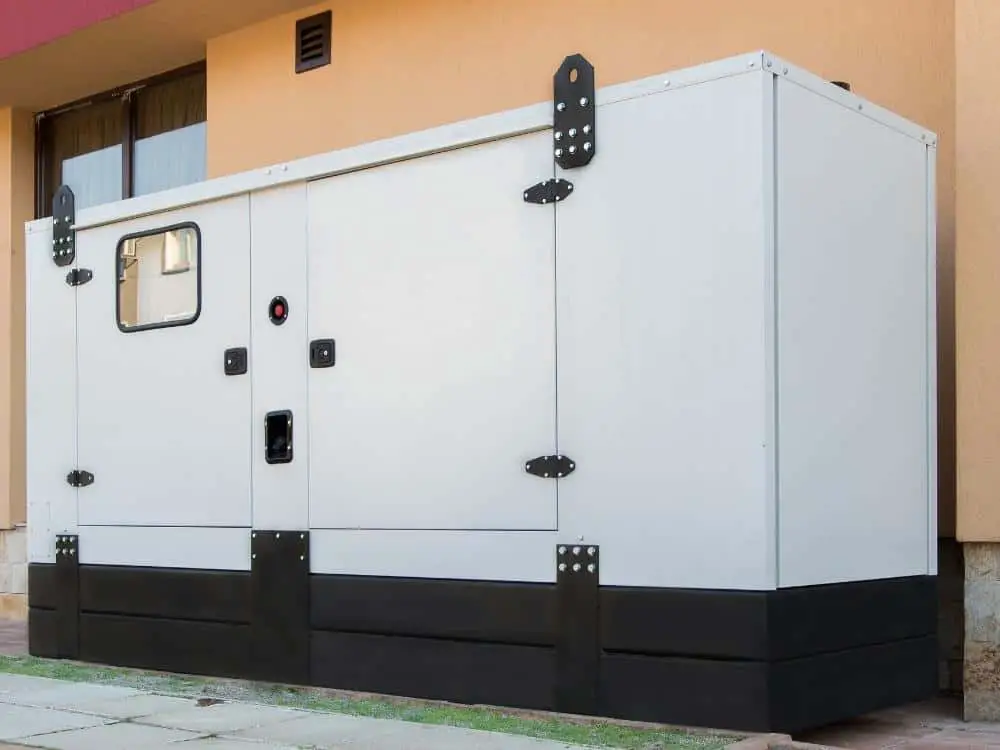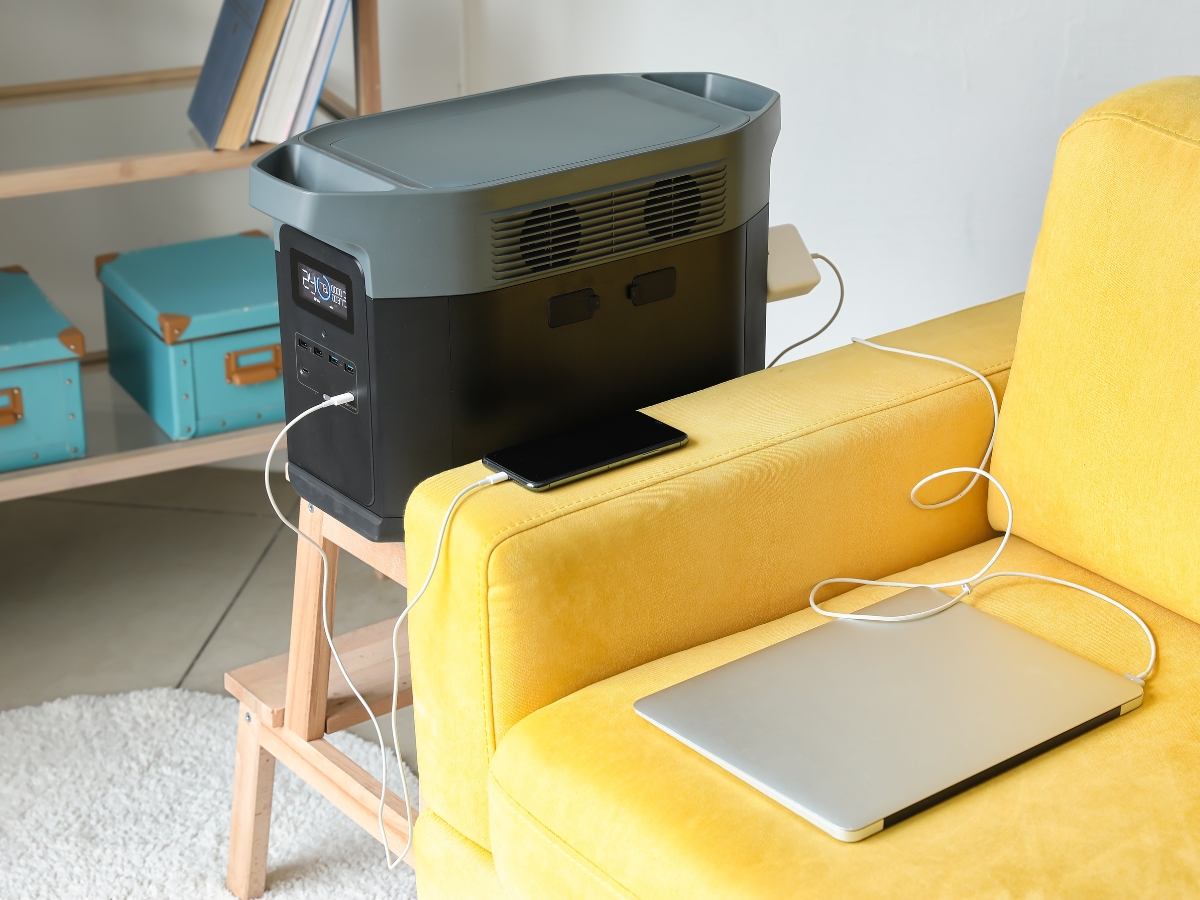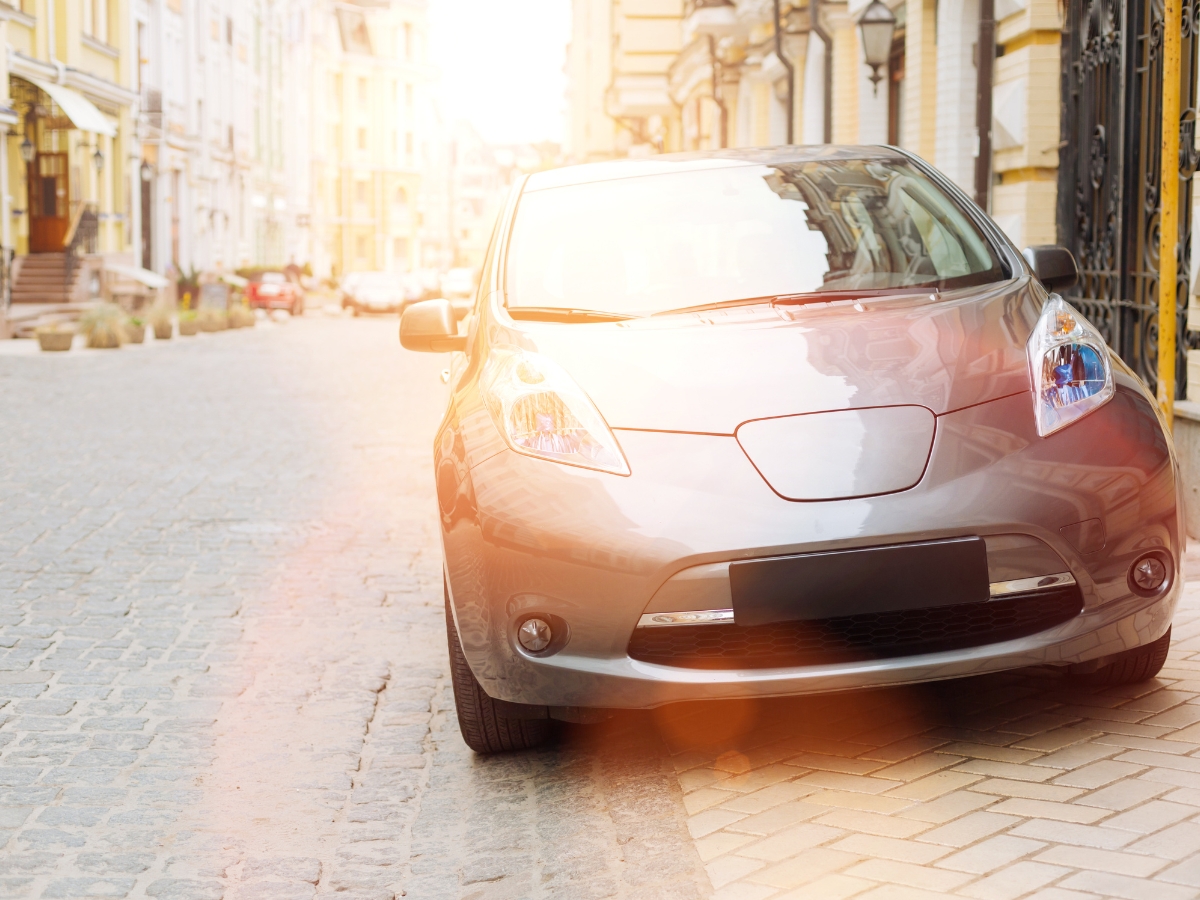Much focus and discussion fall around solar power as an alternative to powering homes as either a backup or to get off the grid, but there is another option as well: to use a generator.
You can power your entire house or only essential elements using a generator, and to do this, you need to know the total wattage and startup wattages of the appliances and then ensure your generator can cover that, plus a little extra to be on the safe side.
In this discussion on generators, we will look at the following key areas:
- How to calculate how much power your house needs
- Costs of a generator vs. solar
- Why do you need a transfer switch
- Pros and cons of using a generator
Let’s explore all of those in a bit more detail so you can get a better understanding of how to power your house with a generator.

How Much Power Does Your House Need?
Knowing how much power your home needs is essential before looking at a generator.
The first step on this journey is to establish how much power your home needs, and here, there are two options to consider. Firstly, are you looking only to power certain essentials in the home when the power goes out, or do you wish to power your entire home using a generator?
For many people, it is the essentials like the fridge, freezer, TV, lighting, computers, Air conditioning, and washing machine; for others, it’s the whole caboodle.
To accurately establish what size generator you will require, you will need to know the total wattage of your power demands as generators are rated by wattages and not by their physical size.
The Two Types Of Wattages On Appliances
There are two power ratings on appliances: running and startup power.
While it might seem as simple as adding up all the watts on your appliances and devices, arriving at a total, and then installing a generator to match – it’s not. There are two wattages to consider with power, the running wattage, and the startup wattage.
Many appliances such as fridges and air conditioners have ‘startup’ wattages 2-3 times more than the rated running wattage. This refers to a power draw needed to ‘start up’ the appliance and get it to its running wattage.
The table below indicates how startup wattage and running wattage differ and why you have to consider this when looking to power your house using a generator or any other non-grid-based power supply.
How Much Power Would Essential Appliances Use?
Appliances may have different power requirements depending on whether they have a motor or not.
We will use five essential appliances in this table to see how much more the startup power is than the running power.
| Appliance Type | Startup Wattage | Running Wattage | Wattage Difference |
| Electric Water Heater | 4500 W | 4500 W | 0 W |
| 2 Ton Air Conditioning | 8750 W | 3800 W | 4950 W |
| Fridge / Freezer | 2900 W | 700 W | 2200 W |
| Clothes Dryer | 6750 W | 5400 W | 1350 W |
| Washing Machine | 1200 W | 1200 W | 0 W |
| Totals | 24100 W | 15600 W | 8500 W |
This clearly illustrates the impact of startup power on the generator power needed to run these appliances in your home.
Then running power is only 15600 W, but the startup power is 54% more than the running wattage needed, so when looking at a generator, you need to have one that can cover the startup power with an additional surplus.
What Size Generator Would I Need To Power These Appliances?
The running wattage would only require a generator of around 17 000W or 17 kW, but with the startup power, this would require at least 25 kW or more, possibly up to 30 kW, to cover the startup power and have some additional power capacity remaining.
Increasing from a 16/17 kW generator to a 30 kW system is significantly more expensive, so you need to consider the costs of using a generator to power your house compared to other alternative energy options – we will look at that a little later on.
How Much Power Would A Whole House Use?
Now, let’s look at the amount of power all electrical systems use in a home. Remember that not all devices have startup wattage requirements, so the generator size required for essential appliances may not be that much smaller than one needed to power an entire house.
| Appliance Type | Startup Wattage | Running Wattage | Wattage Difference |
| Electric Water Heater | 4500 W | 4500 W | 0 W |
| 2 Ton Air Conditioning | 8750 W | 3800 W | 4950 W |
| Fridge / Freezer | 2900 W | 700 W | 2200 W |
| Clothes Dryer | 6750 W | 5400 W | 1350 W |
| Washing Machine | 1200 W | 1200 W | 0 W |
| Cool / Dry Dishwasher | 540 W | 216 W | 324 W |
| TVs (2) | 380 W | 380 W | 0 W |
| Lighting (LED) | 1000 W | 1000 W | 0 W |
| 800W Microwave | 1300 W | 1300 W | 0 W |
| Laptop / Wifi | 300 W | 300 W | 0 W |
| Electrical (Various) | 2000 W | 2000 W | 0 W |
| Totals | 29620 W | 20796 W | 10174 W |
Looking at this table above, you can see that the wattage needed to handle the startup power is almost 30 000 W or 30 kW, while the running power is just under 21 000 W or 21 kW. You can also see that TVs, computers, and lighting don’t add to the startup power.
Realistically and for the same money, you could use a 30 kW generator to power this house, but you would ideally look for a generator that has a little more as a back reserve.
During an outage, you’re sure to minimize your power needs and this Generac could be the backup solution;
No products found.
How To Find The Startup Power Of An Appliance
All appliances will have their startup power ratings listed or available.
While some appliances may have the startup power listed on their specifications label, you can work on 1,5 x – 3x the rated power for the startup power if the appliance has a motor.
Most manufacturers will list the startup power in the manual or online, so you may need to spend a little time researching your appliances to get an accurate assessment.
Get our Power Assessment Done Professionally
Getting an accurate power consumption profile is always recommended over a DIY assessment.
This would be a better option as your DIY calculation will not be 100% accurate, and when it comes to powering your house with a generator, the more accurate your energy requirements are, the better.
Most service providers that supply and install generators will offer these services as part of the contract, so when you are looking for one, check to see if they provide this service or not.
The electrician will be able to connect measuring devices to your DB Board and establish over 24 hours what the peak energy demands are, thereby providing a detailed and more accurate energy consumption profile.
Once this is done, they will then advise you on the size of the generator needed to supply enough power for your house.
Why The Quality Of Electricity Matters?
To avoid damage to expensive electronics, you need to ensure your generator provides ‘clean’ current.
Over and above all the technical elements, you need to ask about the quality of electricity your generator will produce as some electrical current may not be suitable for sensitive electronics like computers and high-end audio equipment.
If your generator produces electricity that could potentially damage sensitive equipment, you may need to unplug those devices before switching on your generator.
Check with the supplier or installer FIRST on whether the generator they are suggesting can safely operate your expensive gear or not.
How Much Do Generators Cost?
Depending on the size of the generator you need, costs can range from as little as $400 for a small portable generator to $15 000 or more for home standby, and that’s not including the installation costs or the fuel costs to power the generator.
This is one of the main drawbacks of using a generator as you need to factor in installation and the diesel/gasoline / natural gas (for home standby systems) costs involved in running them.
Generator Vs. Solar
By comparison, you could also consider solar PV for your home instead of a generator.
According to consumeraffairs.com, the average price of a solar PV system for the average American home after tax credits would be between $11 000 and $15 000, while a generator capable of delivering 20 kW would cost around $6000 for the unit alone, excluding installation.
The reality is that after installation, you may well find that the price of solar and a generator are about the same, but with solar, you don’t have additional operating costs for fuel.
Solar PV Systems will last longer and require very little maintenance, so if you are looking at backup systems or want to move more off-grid, you may want to consider solar as an option as well.
Why You Need A Transfer Switch
The transfer switch ensures that your grid supply is off and your generator runs properly and safely through your home electrical system.
You don’t need to install a transfer switch if you have a small generator with a few plugs on it and only run some essential appliances like the fridge while the power is out. However, if your generator will be powering house circuits, you must have a transfer switch as you risk serious damage to both your home grid and supply grid if you don’t have one.
The transfer switch disconnects the incoming supply to your DB Board from the utility grid and switches it to the electrical supply from the generator and MUST be installed by qualified personnel only.
You wouldn’t need this only if you have a proper standby generator installed, and these units automatically switch when the power goes down.
Using A Generator To Power Your House – Pros And Cons
As with any alternative power, source generators have solid arguments for and against them; let’s look at the pros first.
With A Generator, There Is Always Electricity
Unlike solar or wind-powered systems, a generator only needs fuel to run. Whether it’s diesel, petrol, or natural gas and provided you have fuel; you can comfortably keep your lights on when the power grids fail.
This is probably the biggest reason why so many people use generators to power their house as it’s not dependent on batteries, the sun, or wind to provide power and requires no storage facilities like solar PV.
Generators Are Portable
Unless you have a standby generator that is permanently installed at your home, you can move your generator to where it’s needed, and while some may require some additional lifting assistance, you can load it on the back of your pickup or into your RV and have power available when you need it. It would be a touch difficult to plack your wind turbine for a camping trip!
Generators Are Fuel Efficient
A portable generator can power appliances for 8-18 hours on just a few gallons of diesel or gas, making them efficient in terms of running costs. Of course, solar and wind power don’t require fuel, but your generator can run in any weather without issue, provided it has fuel.
If you have a standby system powered by natural gas, it is also a very efficient fuel source for powering your home.
Using A Generator To Power Your House – The Cons
While it does have some solid benefits, the generator also has some drawbacks; let’s look at those.
Generators Are Noisy
The noise is the most obvious disadvantage of using a generator to power your home. A diesel or gas engine running to generate power will be noisy. Generators have a noise level of between 70dB and 100 dB.
To give you an idea of comparison, from about 23ft away, your generator will have the same noise levels as a busy restaurant or busy traffic at around 70 dB; getting closer will raise that noise level to about 80dB, and this the noise level of a petrol lawnmower.
By comparison, a jet engine creates about 140dB, and any noise levels around 115dB can create hearing damage.
If you use a diesel or petrol generator to power your home, especially if it’s not an inverter generator that is much less noisy, your neighbors may not invite you to their Christmas dinner.
An inverter generator runs at around 50dB- 60dB, so if you are looking at one, consider your neighbors and opt for that one.
Generators Cost Money To Run
Because generators are usually diesel or petrol, making sure you have enough clean fuel supply to operate them is essential, so you need to be aware of your fuel stocks and invest in supply.
Another consideration is the servicing costs. Because your generator is an engine, it will need servicing whether you do it or it’s done professionally.
Generators Need To Be Covered
Using fuel in very cold or wet conditions is not ideal, so you will need to cover your generator or store it undercover for protection against the elements.
Also, remember that the generator emits toxic fumes, and you will need to ensure that those fumes are safely dissipated, so they don’t create health issues, so placing your generator away from home with good ventilation is critical.
Resources
- https://www.consumerreports.org/generators/how-to-choose-the-right-size-generator-a4942266454/
- https://www.forbes.com/advisor/home-improvement/what-size-generator-to-buy/
- https://www.familyhandyman.com/article/choosing-the-best-power-generator/
- https://www.homedepot.com/c/ab/choosing-the-right-size-generator/




